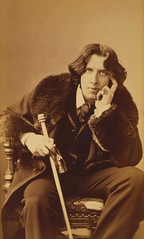
Traduzione by ILARIA CECCHERINI, volontaria di English Gratis.
![]() photo credit: trialsanderrors
photo credit: trialsanderrors
THE HAPPY PRINCE (1)
Il Principe Felice (1)
Vai alla puntata: 2•3•4•5•6•7

[audio:happy1.mp3]High above the city, on a tall column, stood the statue of the Happy Prince.
In alto, sopra la città, su di una lunga colonna, era situata la statua del Principe Felice.
He was gilded all over with thin leaves of fine gold, for eyes he had two bright sapphires, and a large red ruby glowed on his sword-hilt.
Egli era ricoperto di sottili foglie d’oro zecchino, per occhi aveva due zaffiri splendenti, e sull’elsa della sua spada luccicava un grosso rubino rosso.
He was very much admired indeed.
Era molto ammirato davvero.
>>>“He is as beautiful as a weathercock,” remarked one of the Town Councillors who wished to gain a reputation for having artistic tastes; “only not quite so useful,” he added, fearing lest people should think him unpractical, which he really was not.
“E’ bello come un gallo segnavento,” osservò uno degli assessori del Municipio, il quale si augurava di guadagnarsi una reputazione per i suoi gusti in fatto d’arte;“purtroppo non altrettanto utile,” aggiunse, per timore che la gente lo pensasse poco pratico, cosa che lui davvero non era.
“Why can’t you be like the Happy Prince?” asked a sensible mother of her little boy who was crying for the moon.
“Perché non puoi essere come il Principe Felice?” chiese una madre saggia al suo bambino che piangeva per avere la luna nel pozzo.
“The Happy Prince never dreams of crying for anything.”
“Il Principe Felice non si sogna neanche lontanamente di piangere per qualcosa.”
“I am glad there is some one in the world who is quite happy,” muttered a disappointed man as he gazed at the wonderful statue.
“Sono lieto che ci sia qualcuno al mondo che è così felice,” mormorò un uomo rattristato mentre ammirava la splendida statua.
“He looks just like an angel,” said the Charity Children as they came out of the cathedral in their bright scarlet cloaks and their clean white pinafores.
“Sembra proprio un angelo, dissero gli orfanelli mentre uscivano dalla cattedrale nei loro mantelli scarlatto vivo e i lindi grembiuli bianchi.
“How do you know?” said the Mathematical Master, “you have never seen one.”
“Come fai a saperlo?” disse l’Insegnante di Matematica, “non ne avete mai visto uno.”
“Ah! but we have, in our dreams,” answered the children; and the Mathematical Master frowned and looked very severe, for he did not approve of children dreaming.
“Oh, ma noi lo abbiamo visto, nei nostri sogni,” risposero i bambini; e l’Insegnante di Matematica aggrottò le sopracciglia e sembrò irrigidirsi, poiché non approvava i bambini che sognavano.
One night there flew over the city a little Swallow.
Una notte volò sulla città un Rondinotto.
His friends had gone away to Egypt six weeks before, but he had stayed behind, for he was in love with the most beautiful Reed.
I suoi compagni se n’erano andati in Egitto sei settimane prima, ma lui era rimasto indietro, perché era innamorato di una bellissimal Basettina.
He had met her early in the spring as he was flying down the river after a big yellow moth, and had been so attracted by her slender waist that he had stopped to talk to her.
L’aveva incontrata all’inizio della primavera mentre volava lungo il fiume dietro ad una falena gialla, ed era rimasto così attratto dalla suo vitino sottile, che si era fermato a parlarle.
“Shall I love you?” said the Swallow, who liked to come to the point at once, and the Reed made him a low bow.
“Posso innamorami di te?” disse il rondinotto, a cui piaceva arrivare subito al punto, e la Basettina gli fece un profondo inchino.
So he flew round and round her, touching the water with his wings, and making silver ripples.
Così lui le volò intorno, toccando l’acqua con le ali, muovendo onde d’argento.
This was his courtship, and it lasted all through the summer.
Questo era il suo modo di corteggiare, e durò tutta l’estate.
“It is a ridiculous attachment,” twittered the other Swallows; “she has no money, and far too many relations”; and indeed the river was quite full of Reeds.
“E’ un legame ridicolo,” cinguettarono le altre Rondini; “non ha soldi, e per giunta ha troppi parenti”; e il fiume era davvero pieno zeppo di Basettini.
Then, when the autumn came they all flew away.
Poi, quando venne l’autunno, tutti volarono via.
After they had gone he felt lonely, and began to tire of his lady-love.
Dopo che se n’erano andati, lui si sentì solo, e iniziò ad essere stanco del suo innamorato.
“She has no conversation,” he said, “and I am afraid that she is a coquette, for she is always flirting with the wind.”
“Non sa fare conversazione,” disse, “e temo che sia una civetta, poiché fa isempre la carina anche col vento.”
And certainly, whenever the wind blew, the Reed made the most graceful curtseys.
E davvero ogni volta che soffiava il vento, la Basettina faceva i più graziosi inchini.
“I admit that she is domestic,” he continued, “but I love travelling, and my wife, consequently, shouldd love travelling also.”
“Ammetto che sia amante della casa,” continuò, “ma a me piace viaggiare e mia moglie, di conseguenza, dovrebbe anche lei amare i viaggi.”

